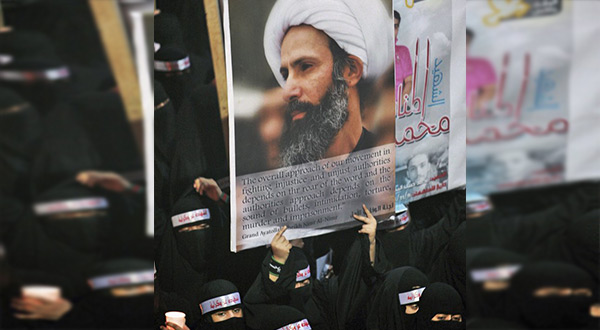The country's Supreme Court recently upheld the death penalty in the case, raising concerns among rights activists that the group could be executed at any moment.
Human rights groups said the trial was unfair, saying the defendants' confessions were extracted under duress and that some did not have lawyers present in court. Three of the defendants were 17 years old when the alleged crimes were committed.
The mother of one of the defendants said her son's lawyer was pressured to quit his defense and so withdrew from the trial, leaving her son to represent himself.
"He had to defend himself and answer his own questions in court," said Zahra Abdullah, the mother of defendant Munir al-Adam. "I am demanding either a just trial or their release," she added. "To issue the death penalty for protests isn't right."
Also facing execution is Mujtaba al-Sweikat, a young Saudi man who had been accepted to attend Western Michigan University before his arrest. The American Federation of Teachers, which says it represents 1.6 million members nationwide, is urging President Donald Trump to demand that Saudi Arabia halt the executions.
In response to the outcry, the Saudi Justice Ministry issued a rare statement defending its judicial process and the verdicts. It said the 14 were convicted of "terrorist crimes".
The ministry alleged the group received a fair trial, and that three different courts and a total of 13 judges examined the case. The ministry said severe punishment is handed down only in cases where the most dangerous crimes are committed.
Abdullah said her son took part in protests to demand equality and greater rights. Among the charges he faced were throwing rocks at police and firing on a police checkpoint. She says her son denies the charge of firing on police.
The apartheid kingdom has one of the highest rates of execution in the world. Last year, 47 people were executed on one day, including a prominent Saudi Shiite cleric his eminence Sheikh Nimr al-Nimr who denied the charges of sedition. His supporters say he was punished for being an outspoken government critic and a key leader of the Shiite protests in eastern Saudi Arabia in 2011 and 2012.
The group of 14 were charged for their role in those same protests.
Reprieve, an advocacy group that opposes the death penalty, said it has established that at least one of the defendants was never permitted to see a lawyer. In al-Adam's case, no evidence against him was presented at trial, said Reprieve.
Activists say there is growing cause for concern after the kingdom executed four Shiites in July convicted on charges of "terrorism" for their role in the same protests and violence with security forces.
On Friday, 10 Nobel Peace Prize winners appealed to Saudi King Salman and his son, the crown prince, to halt the executions.
Human Rights Watch says that if Saudi Arabia's new leadership is serious about reform, "they should immediately step in to stop these executions." In a joint statement, HRW and Amnesty International said the rise in death sentences against Shiites in Saudi Arabia "is alarming and suggests that the authorities are using the death penalty to settle scores and crush dissent under the guise of combating ‘terrorism.'"
Saudi Shiites, who are a minority in the kingdom but make up the bulk of the population in the kingdom's eastern region, had been targeted by extremists in recent years. A number of bombings had struck Shiites mosques in the east.
Saudi Crown Prince Mohammed bin Salman, who was elevated as heir to the throne in late June, had fashioned himself as a modernizer. He's set out lofty goals for the kingdom to achieve by 2030, promising a dramatic shake-up, but has given no indication he is willing to address Shiite grievances.
Nowhere are sectarian tensions in Saudi Arabia more visible than in the eastern town of al-Awamiya, the hometown of al-Nimr, the executed cleric.
Around two dozen people had lost their lives this year there. Violence spiked in May after the regime began demolishing the city's historic center, including hundreds of homes. Among those martyred in the unrest is a three year-old boy, Sajjad al-Abdallah, who passed away last week. Residents in al-Awamiya say he was shot by Saudi security forces while in the backseat of a car.
Abdullah says her son was 18 years old at the time of his arrest. He'd found work at a factory outside Awamiya and had dropped out of school because the family was struggling financially.
"As Shiites we have been targeted for a long time. There is no equality. All the government posts and influential positions are not for us," she said.
/106

